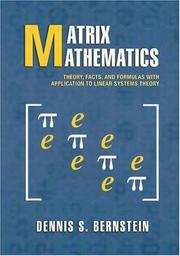
ISBN: 9780691118024 0691118027 Year: 2005 Publisher: Princeton (N.J.) : Princeton university press,
Abstract | Keywords | Export | Availability | Bookmark
 Loading...
Loading...Choose an application
- Reference Manager
- EndNote
- RefWorks (Direct export to RefWorks)
Matrices --- Linear systems --- Systèmes linéaires --- 512.64 --- 681.3*G13 --- Linear and multilinear algebra. Matrix theory --- Numerical linear algebra: conditioning; determinants; eigenvalues and eigenvectors; error analysis; linear systems; matrix inversion; pseudoinverses; singular value decomposition; sparse, structured, and very large systems (direct and iterative methods) --- Matrices. --- Linear systems. --- 512.64 Linear and multilinear algebra. Matrix theory --- Systèmes linéaires --- Algebra, Matrix --- Cracovians (Mathematics) --- Matrix algebra --- Matrixes (Algebra) --- Algebra, Abstract --- Algebra, Universal --- Systems, Linear --- Differential equations, Linear --- System theory
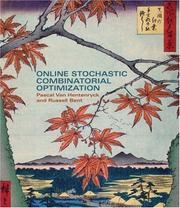
ISBN: 9780262220804 0262220806 9780262513470 0262513471 0262257157 1282096834 1429477741 9780262257152 9781429477741 0262299984 Year: 2006 Publisher: Cambridge (Mass.): MIT Press,
Abstract | Keywords | Export | Availability | Bookmark
 Loading...
Loading...Choose an application
- Reference Manager
- EndNote
- RefWorks (Direct export to RefWorks)
"Online decision making under uncertainty and time constraints represents one of the most challenging problems for robust intelligent agents. In an increasingly dynamic, interconnected, and real-time world, intelligent systems must adapt dynamically to uncertainties, update existing plans to accommodate new requests and events, and produce high-quality decisions under severe time constraints. Such online decision-making applications are becoming increasingly common: ambulance dispatching and emergency city-evacuation routing, for example, are inherently online decision-making problems; other applications include packet scheduling for Internet communications and reservation systems. This book presents a novel framework, online stochastic optimization, to address this challenge. This framework assumes that the distribution of future requests, or an approximation thereof, is available for sampling, as is the case in many applications that make either historical data or predictive models available. It assumes additionally that the distribution of future requests is independent of current decisions, which is also the case in a variety of applications and holds significant computational advantages. The book presents several online stochastic algorithms implementing the framework, provides performance guarantees, and demonstrates a variety of applications. It discusses how to relax some of the assumptions in using historical sampling and machine learning and analyzes different underlying algorithmic problems. And finally, the book discusses the framework's possible limitations and suggests directions for future research."--Publisher's website.
Stochastic processes --- Combinatorial optimization --- Online algorithms --- Operations research --- Processus stochastiques --- Optimisation combinatoire --- Recherche opérationnelle --- Stochastic processes. --- Combinatorial optimization. --- Online algorithms. --- Operations research. --- 681.3*G13 --- Operational analysis --- Operational research --- Industrial engineering --- Management science --- Research --- System theory --- Computer algorithms --- Online data processing --- Optimization, Combinatorial --- Combinatorial analysis --- Mathematical optimization --- Random processes --- Probabilities --- Numerical linear algebra: conditioning; determinants; eigenvalues and eigenvectors; error analysis; linear systems; matrix inversion; pseudoinverses; singular value decomposition; sparse, structured, and very large systems (direct and iterative methods) --- COMPUTER SCIENCE/General
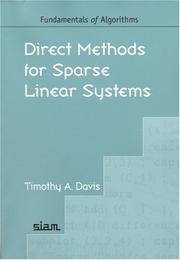
ISBN: 9780898716139 0898716136 Year: 2006 Publisher: Philadelphia: Society for industrial and applied mathematics,
Abstract | Keywords | Export | Availability | Bookmark
 Loading...
Loading...Choose an application
- Reference Manager
- EndNote
- RefWorks (Direct export to RefWorks)
Sparse matrices --- Linear systems --- Matrices éparses --- Systèmes linéaires --- 519.61 --- 681.3*G13 --- Numerical methods of algebra --- Numerical linear algebra: conditioning; determinants; eigenvalues and eigenvectors; error analysis; linear systems; matrix inversion; pseudoinverses; singular value decomposition; sparse, structured, and very large systems (direct and iterative methods) --- 519.61 Numerical methods of algebra --- Matrices éparses --- Systèmes linéaires --- Spare matrix techniques --- Matrices --- Systems, Linear --- Differential equations, Linear --- System theory
Book
ISBN: 303656148X 3036561471 Year: 2022 Publisher: Basel MDPI - Multidisciplinary Digital Publishing Institute
Abstract | Keywords | Export | Availability | Bookmark
 Loading...
Loading...Choose an application
- Reference Manager
- EndNote
- RefWorks (Direct export to RefWorks)
The present book contains five papers accepted and published in the Special Issue, “Fuzzy Natural Logic in IFSA-EUSFLAT 2021”, of the journal Mathematics (MDPI). These papers are extended versions of the contributions presented in the conference “The 19th World Congress of the International Fuzzy Systems Association and the 12th Conference of the European Society for Fuzzy Logic and Technology jointly with the AGOP, IJCRS, and FQAS conferences”, which took place in Bratislava (Slovakia) from September 19 to September 24, 2021. Fuzzy Natural Logic (FNL) is a system of mathematical fuzzy logic theories that enables us to model natural language terms and rules while accounting for their inherent vagueness and allows us to reason and argue using the tools developed in them. FNL includes, among others, the theory of evaluative linguistic expressions (e.g., small, very large, etc.), the theory of fuzzy and intermediate quantifiers (e.g., most, few, many, etc.), and the theory of fuzzy/linguistic IF–THEN rules and logical inference. The papers in this Special Issue use the various aspects and concepts of FNL mentioned above and apply them to a wide range of problems both theoretically and practically oriented. This book will be of interest for researchers working in the areas of fuzzy logic, applied linguistics, generalized quantifiers, and their applications.
Research & information: general --- Mathematics & science --- fuzzy Peterson’s syllogisms --- fuzzy intermediate quantifiers --- graded Peterson’s cube of opposition --- linguistic universals --- linguistic complexity --- evaluative expressions --- fuzzy grammar --- linguistic gradience --- linguistic constraints --- grammaticality --- sentiment analysis --- closeness --- closeness matrix --- closeness space --- function similarity --- fuzzy partition --- fuzzy transform --- preimage problem --- singular value decomposition --- evolving fuzzy neural network --- or-neuron --- auction fraud --- knowledge extraction --- n/a --- fuzzy Peterson's syllogisms --- graded Peterson's cube of opposition
Book
Year: 2021 Publisher: Basel, Switzerland MDPI - Multidisciplinary Digital Publishing Institute
Abstract | Keywords | Export | Availability | Bookmark
 Loading...
Loading...Choose an application
- Reference Manager
- EndNote
- RefWorks (Direct export to RefWorks)
This Special Issue presents the latest state-of-the-art research on solid fuels technology with dedicated, focused research papers. There are a variety of topics to choose from among the seven published re-search works to bring you up to date with the current trends in academia and industry.
History of engineering & technology --- peak shaving --- battery storage --- peak demand pricing --- lithium-ion --- tariff structure --- receiving-end system --- multi-infeed HVDCs --- security assessment --- emergency control strategy --- electromagnetic transient (EMT)-transient stability (TS) hybrid simulation --- impedance determination --- lossy compression algorithms --- singular value decomposition --- wavelet transformation --- voltage control --- deep deterministic policy gradient --- deep reinforcement learning --- model uncertainties --- energy communities --- machine learning --- forecasting --- abnormal data --- wind power --- outliers --- electricity consumption representative profiles --- self-consumption
Book
Year: 2021 Publisher: Basel, Switzerland MDPI - Multidisciplinary Digital Publishing Institute
Abstract | Keywords | Export | Availability | Bookmark
 Loading...
Loading...Choose an application
- Reference Manager
- EndNote
- RefWorks (Direct export to RefWorks)
This Special Issue presents the latest state-of-the-art research on solid fuels technology with dedicated, focused research papers. There are a variety of topics to choose from among the seven published re-search works to bring you up to date with the current trends in academia and industry.
peak shaving --- battery storage --- peak demand pricing --- lithium-ion --- tariff structure --- receiving-end system --- multi-infeed HVDCs --- security assessment --- emergency control strategy --- electromagnetic transient (EMT)-transient stability (TS) hybrid simulation --- impedance determination --- lossy compression algorithms --- singular value decomposition --- wavelet transformation --- voltage control --- deep deterministic policy gradient --- deep reinforcement learning --- model uncertainties --- energy communities --- machine learning --- forecasting --- abnormal data --- wind power --- outliers --- electricity consumption representative profiles --- self-consumption
Book
Year: 2021 Publisher: Basel, Switzerland MDPI - Multidisciplinary Digital Publishing Institute
Abstract | Keywords | Export | Availability | Bookmark
 Loading...
Loading...Choose an application
- Reference Manager
- EndNote
- RefWorks (Direct export to RefWorks)
This Special Issue presents the latest state-of-the-art research on solid fuels technology with dedicated, focused research papers. There are a variety of topics to choose from among the seven published re-search works to bring you up to date with the current trends in academia and industry.
History of engineering & technology --- peak shaving --- battery storage --- peak demand pricing --- lithium-ion --- tariff structure --- receiving-end system --- multi-infeed HVDCs --- security assessment --- emergency control strategy --- electromagnetic transient (EMT)-transient stability (TS) hybrid simulation --- impedance determination --- lossy compression algorithms --- singular value decomposition --- wavelet transformation --- voltage control --- deep deterministic policy gradient --- deep reinforcement learning --- model uncertainties --- energy communities --- machine learning --- forecasting --- abnormal data --- wind power --- outliers --- electricity consumption representative profiles --- self-consumption
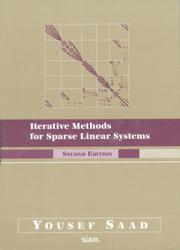
ISBN: 0898715342 9780898715347 Year: 2003 Publisher: Philadelphia PA: Society for industrial and applied mathematics,
Abstract | Keywords | Export | Availability | Bookmark
 Loading...
Loading...Choose an application
- Reference Manager
- EndNote
- RefWorks (Direct export to RefWorks)
Sparse matrices --- Iterative methods (Mathematics) --- Differential equations, Partial --- Matrices éparses --- Itération (Mathématiques) --- Equations aux dérivées partielles --- Numerical solutions --- Solutions numériques --- Sparse matrices. --- Numerical solutions. --- Iterative methods (Mathematics). --- Matrices éparses --- Itération (Mathématiques) --- Equations aux dérivées partielles --- Solutions numériques --- Numerical solutions of algebraic equations --- 519.61 --- 681.3*G13 --- -Iterative methods (Mathematics) --- Spare matrix techniques --- Iteration (Mathematics) --- Numerical methods of algebra --- Numerical linear algebra: conditioning; determinants; eigenvalues and eigenvectors; error analysis; linear systems; matrix inversion; pseudoinverses; singular value decomposition; sparse, structured, and very large systems (direct and iterative methods) --- 519.61 Numerical methods of algebra --- Matrices --- Numerical analysis --- Partial differential equations --- Differential equations, Partial - Numerical solutions
Book
ISBN: 1441998861 144199887X Year: 2011 Publisher: New York : Springer,
Abstract | Keywords | Export | Availability | Bookmark
 Loading...
Loading...Choose an application
- Reference Manager
- EndNote
- RefWorks (Direct export to RefWorks)
Aside from distribution theory, projections and the singular value decomposition (SVD) are the two most important concepts for understanding the basic mechanism of multivariate analysis. The former underlies the least squares estimation in regression analysis, which is essentially a projection of one subspace onto another, and the latter underlies principal component analysis, which seeks to find a subspace that captures the largest variability in the original space. This book is about projections and SVD. A thorough discussion of generalized inverse (g-inverse) matrices is also given because it is closely related to the former. The book provides systematic and in-depth accounts of these concepts from a unified viewpoint of linear transformations finite dimensional vector spaces. More specially, it shows that projection matrices (projectors) and g-inverse matrices can be defined in various ways so that a vector space is decomposed into a direct-sum of (disjoint) subspaces. Projection Matrices, Generalized Inverse Matrices, and Singular Value Decomposition will be useful for researchers, practitioners, and students in applied mathematics, statistics, engineering, behaviormetrics, and other fields.
Mathematical statistics. --- Matrices. --- Multivariate analysis. --- Multivariate analysis -- Problems, exercises, etc. --- Singular value decomposition --- Matrix inversion --- Algebras, Linear --- Mathematics --- Physical Sciences & Mathematics --- Algebra --- Mathematical Statistics --- Decomposition method. --- Matrix inversion. --- Algebras, Linear. --- Linear algebra --- Inverse matrices --- Inverse of a matrix --- Inversion, Matrix --- Method, Decomposition --- Algebra, Matrix --- Cracovians (Mathematics) --- Matrix algebra --- Matrixes (Algebra) --- Statistics. --- Statistics, general. --- Statistics for Life Sciences, Medicine, Health Sciences. --- Algebra, Universal --- Generalized spaces --- Mathematical analysis --- Calculus of operations --- Line geometry --- Topology --- Linear operators --- Matrices --- Operations research --- Programming (Mathematics) --- System analysis --- Algebra, Abstract --- Generalized inverses --- Statistical analysis --- Statistical data --- Statistical methods --- Statistical science --- Econometrics --- Statistics .
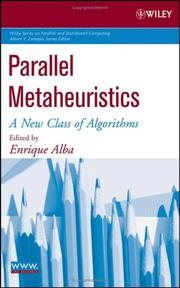
ISBN: 0471678066 9780471678069 Year: 2005 Publisher: Hoboken, N.J. Wiley
Abstract | Keywords | Export | Availability | Bookmark
 Loading...
Loading...Choose an application
- Reference Manager
- EndNote
- RefWorks (Direct export to RefWorks)
519.6 --- 681.3*G13 --- Computational mathematics. Numerical analysis. Computer programming --- Numerical linear algebra: conditioning; determinants; eigenvalues and eigenvectors; error analysis; linear systems; matrix inversion; pseudoinverses; singular value decomposition; sparse, structured, and very large systems (direct and iterative methods) --- 519.6 Computational mathematics. Numerical analysis. Computer programming --- Computer science --- Mathematical optimization --- Parallel algorithms --- Operations research --- Optimisation mathématique --- Algorithmes parallèles --- Recherche opérationnelle --- Algorithms --- Operational analysis --- Operational research --- Industrial engineering --- Management science --- Research --- System theory --- Optimization (Mathematics) --- Optimization techniques --- Optimization theory --- Systems optimization --- Mathematical analysis --- Maxima and minima --- Simulation methods --- System analysis --- Optimisation mathématique. --- Algorithmes parallèles. --- Recherche opérationnelle. --- Optimisation mathématique. --- Algorithmes parallèles. --- Recherche opérationnelle.

 Search
Search Feedback
Feedback About UniCat
About UniCat  Help
Help News
News